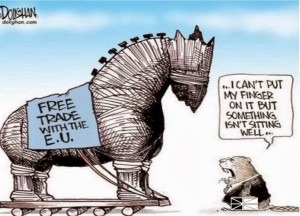Africa, the birthplace of mankind is currently overwhelmed by civil unrest, interstate violence and bloodshed. One can’t help but
to wonder why. For me, conflicts in Africa stem from the years and years of Western colonialism. And, it still continues until today, a sort
of “neo-imperialism” if you will. Western societies, with their lavish lifestyle, are always eager to have more and more. And, one of the ways
they spend on their lifestyle is by buying diamonds, but these are in fact blood diamonds. Little do they that their appetite for “shiny” goods
are destroying lives, disrupting societies and causing deaths to thousands of Africans every year.
I would like to focus my attention to an example of how Western societies have a direct link to conflicts in Africa. And, I am referring to one
African nation in particular; Sierra Leone. The major issue I want express my opinion on are blood diamonds. We might be aware of this and
might have even seen the movie starring Leonardo DiCaprio. But the fact of the matter is that blood diamonds or conflict diamonds are a
huge economic, political and social problem in Africa. Why? This is because there is always sharp demands for diamonds in the global
market. As long as there is a buyer outside of Africa that is wiling to pay a hefty price, the supply and demand of blood diamonds continues.
According to CNN, blood diamonds are illegal traded diamonds that are used to fund war and conflict. Guess who wants these diamonds?
Yes, the West. The situation here is that you have a very valuable item like a diamond that needs to be extracted cheaply and government
rebels are in total control of the areas where diamonds are mined. These diamonds are then sold to buy weapons and ammunition. The
diamonds bought are then re-sold to the general public.
Western consumers have to face the harsh reality that these diamonds that they are purchasing may be extracted under gruesome and
torturous conditions where workers work long hours, rain or shine, and with no pay. These place always had and will continue to have
serious violations of human rights.This is modern slavery. Furthermore, many of these workers are children separated from their families
and forced to find diamonds. What’s worse is that these children are being indoctrinated by rebel leaders to carry on the legacy of violent
rebellion and oppression. This is the principal reason as to why African societies are just in a sorry state of affairs, especially those where
blood diamonds are being extracted.
In conclusion, I would like to plea to Western countries and to the general public to STOP buying diamonds that are from war-torn areas
like Sierra Leone. We can no longer be ignorant and foolish. Trading blood diamonds are reality and it effects us all because we are
connected in the “blood diamond” chain. Stop buying and they will stop supplying.
